Circumpolar Music Series 2024-2025 Season Announcement!
by Dr. Sean Dowgray, CMS Faculty Organizer and Term Assistant Professor of Music
Anyone who knows me will tell you that, as a musician and creative practitioner, I am always looking forward to the next great event, whether it be an ambitious musical performance, a dedicated collaborative project, an engaging hand-on workshop, or a thought provoking lecture. So understandably, I am thrilled to announce the first event of the 2024-2025 Circumpolar Music Series which will take place later this month on Friday, October 18th at 7:30pm in the Davis Concert Hall. But before I announce what is to come, I must first take us back to one of last year’s CMS events which featured Dr. Heidi Aklaseaq Senungetuk, a violinist and ethnomusicologist born with ancestral roots in Wales (Kiŋigin).
When Dr. Senungetuk visited last March, she presented two lectures - a morning lecture to the newly redesigned Alaska Native Music (ANM) course and an evening lecture to the Fairbanks community in the Davis concert hall. In her morning lecture, Dr. Senungetuk spoke to ANM about her own work as a violinist and an ethnomusicologist, touching on the ways in which her performative and ethnomusicological efforts have both converged and diverged throughout her career. We opened up this particular class to the community, which sparked thoughtful discussion between students ingesting this material for the first time, and community members, some of whom knew very well the topics and experiences that Dr. Senungetuk presented on. Her evening lecture in the Davis concert hall surveyed music and dance practices spanning the entire circumpolar region of the world. In Alaska, Dr. Senungetuk featured the Kingikmiut Singers and Dancers of Anchorage. In Canada, she surveyed the Ulukhaktok Western Drummers and Dancers as well as Inuit drum dancing and Katajjaq (throat singing) at the Gjoa Haven Dance Festival. In Tasiilaq, Greenland, a traditional Inuit drum dance revealed a much more intimate approach to drumming and dancing compared to the groups of Alaska. From there, Dr. Senungetuk showed a video of a Sami drummer in Kjøllefjord, Norway. At first, the drummer scraped the frame of the drum with his mallet, creating a sustained wooden effect. This was followed by an incredibly warm, reverberant tone of the drum which accompanied his yoik singing. As Dr. Senungetuk described, “Yoik, as I understand, is a form of an honorific - a way of honoring someone, or perhaps something… or maybe a way of maintaining a connection with an ancestor of the past by keeping the memory of the person alive in the present moment.” In Russia, the audience learned about the Solnyshko Dancers from Novoye Chaplino, where females assumed the drumming responsibility, playing similarly to the Iñupiaq style, that is, hitting the drum from the back with a slender stick. These examples illustrate some of the groups and practices that comprise ongoing Indigenous circumpolar music practices in Dr. Senungetuk’s presentation. And while each example showcased subtle similarities and differences, it was clear to Dr. Senungetuk that despite the geographical spread of the circumpolar, Indigenous peoples of the circumpolar arctic regions have a similar view of the world; a view from the North.

I say all this to help illustrate the realization that I had during Dr. Senungetuk’s visit: the few days we had would not be nearly enough time to showcase the breadth of knowledge, ability, and artistry that she possesses, let alone her deep connection to Fairbanks. Given this, we began discussing her return before she even left back in March. And it is with this that we are excited to announce her return to Fairbanks on Friday, October 18th, 2024 at 7:30pm in the Davis Concert Hall. This time, Dr. Senungetuk will be featured as a performer and joined by Wild Shore New Music - one of Alaska’s few organizations dedicated to contemporary chamber music. Embarking on an Alaska tour, Wild Shore and Dr. Senungetuk will visit Homer, Kenai, Anchorage, and Fairbanks.
Wild Shore New Music is celebrating its eleventh season this fall by exploring Alaska’s origins and connections to contemporary American culture. Wild Shore’s program will feature Dr. Heidi Aklaseaq Senungetuk. They will also be joined by Alaskan musicians Dr. Miriam English Ward (viola) and Charles Akert (cello). Together with Wild Shore's co-founders Katie Cox (flute), Andie Tanning (violin), and Conrad Winslow (composer/pianist), Dr. Senungetuk and the guest musicians will present a program centered around the Alaskan premiere of "For Zitkála-Šá Series" by Raven Chacon, as well as Dr. Senungetuk’s interpretation of George Rochberg's "50 Caprice Variations" for solo violin. Other works performed on this program include the dedicated American Indian classical composer/pianist Jerod Impichchaachaaha’ Tate’, Kanaka Maoli composer/multimedia artist/curator/scholar/and educator, Leilehua Lanzilotti, and composer/pianist Timo Andres. This concert will also feature our community’s very own Fairbanks Flutists directed by Dorli McWayne.
I thank all of you who have supported the Circumpolar Music Series so far. We look forward to seeing you for our season opener on Friday, October 18th at 7:30pm in the Davis Concert Hall.
About the Performers:

Heidi Aklaseaq Senungetuk (Kingikmiut Inupiaq) is a violinist and ethnomusicologist. Before joining Emory University as an Assistant Teaching Professor in Music, Dr. Senungetuk held positions at McGill University and the University of Alaska. Her article “Indigenous Musics of the Arctic” was published by Oxford Bibliographies in Music (2017), and her “Prologue: Pagmapak: In Modern Times” was included in the book Music and Modernity Among First Peoples of North America (2019, Wesleyan University Press). Her essay “Tavluġun atuutit: chin marking music” is included in Raven Chacon’s score For Zitkála-Šá (2022, Art Metropole). Senungetuk’s chapter "Story Songs: Indigenous Traditions and Transformations in Alaska Native Music and Dance" was recently published in the fourth edition of the text World Music: Traditions and Transformations (2023, McGraw Hill).
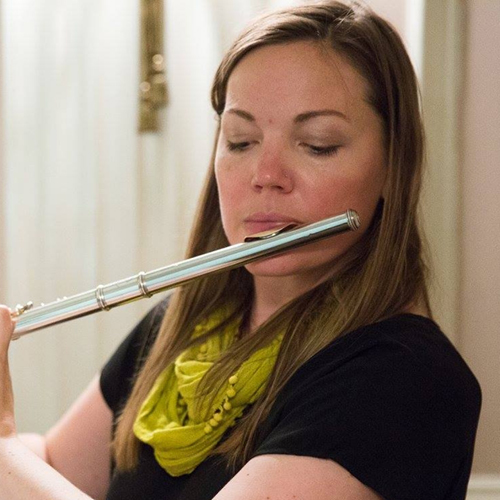
Katie Cox is a flutist and educator based in Brooklyn, NY. She has performed with ensembles such as Contemporaneous, Ensemble Signal, Experiments in Opera, and Bang on a Can, and is a member of Hotel Elefant and CORVUS. Katie is the Executive Director of Wild Shore New Music and is set to perform in Meredith Monk’s new opera “Indra’s Net” at the Park Avenue Armory this fall.
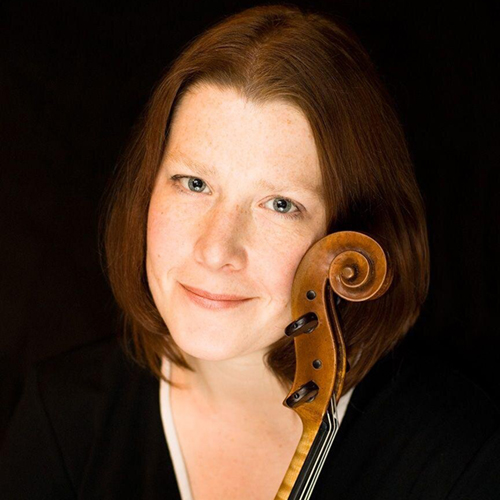
Dr. Miriam English Ward is a violist who has performed chamber music and as a soloist throughout the United States and internationally. She has taught at the Juilliard School, the Peabody Conservatory, and various colleges, including Ripon College and Lewis & Clark College. Recent projects include recordings for Naxos, performances for All Classical FM, and a new viola concerto by Jasnam Daya Singh with the Portland Chamber Orchestra. She currently teaches viola at the University of Alaska in Anchorage.
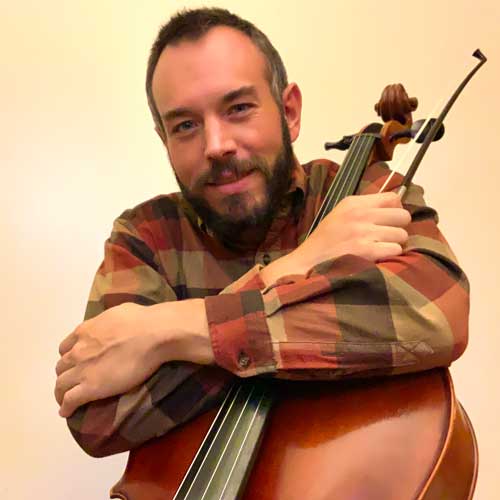
Charles Akert has been praised for his sensitivity and understated virtuosity. Born in Alaska, he has enjoyed a multifaceted career as a soloist, chamber musician, and recording artist, performing from Carnegie Hall to NPR’s Tiny Desk Concerts. His collaborations include working with violist Kim Kashkashian and bands like The Family Crest and The Trans-Siberian Orchestra. He has held residencies at the Banff Centre, Aspen Music Festival, and Carnegie Mellon University and won first prize at the Plowman National Chamber Music competition with the Nexus String Quartet.
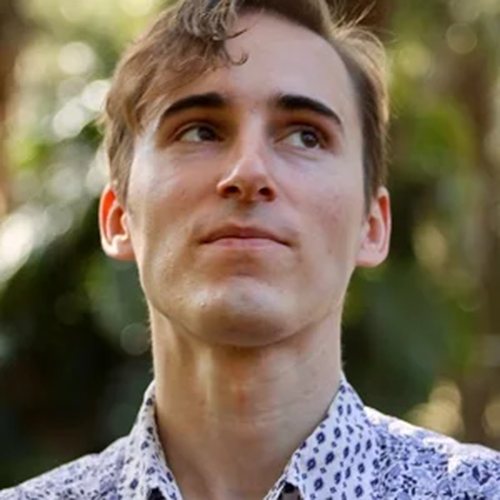
Conrad Winslow is a composer known for his expressive and legible musical forms, blending sharp edges with fluid syntax. His music has been commissioned by Alarm Will Sound, Carnegie Hall, and the American Composers Orchestra, among others. He has received awards and support from The Minnesota Orchestra and The MacDowell Colony. Conrad lives in Berlin and Waldoboro, Maine.
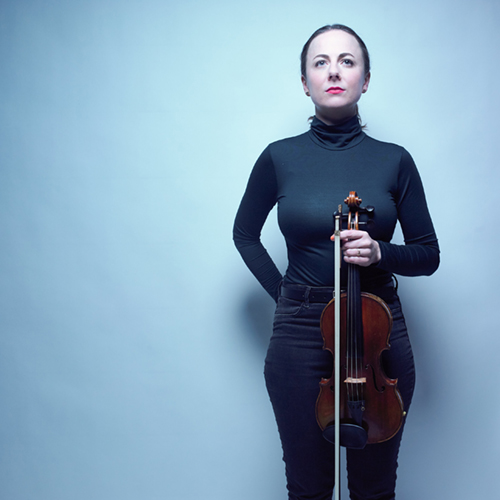
Andie Tanning is the co-founder and musical director of Wild Shore New Music. Her debut album, “Dandelion,” was released in December 2018. She has toured internationally with the New York City Players and performed with theater groups Object Collection and New Paradise Laboratories. She has performed at LA Opera, The Kitchen, The Pompidou, and Carnegie Hall.
About the Author
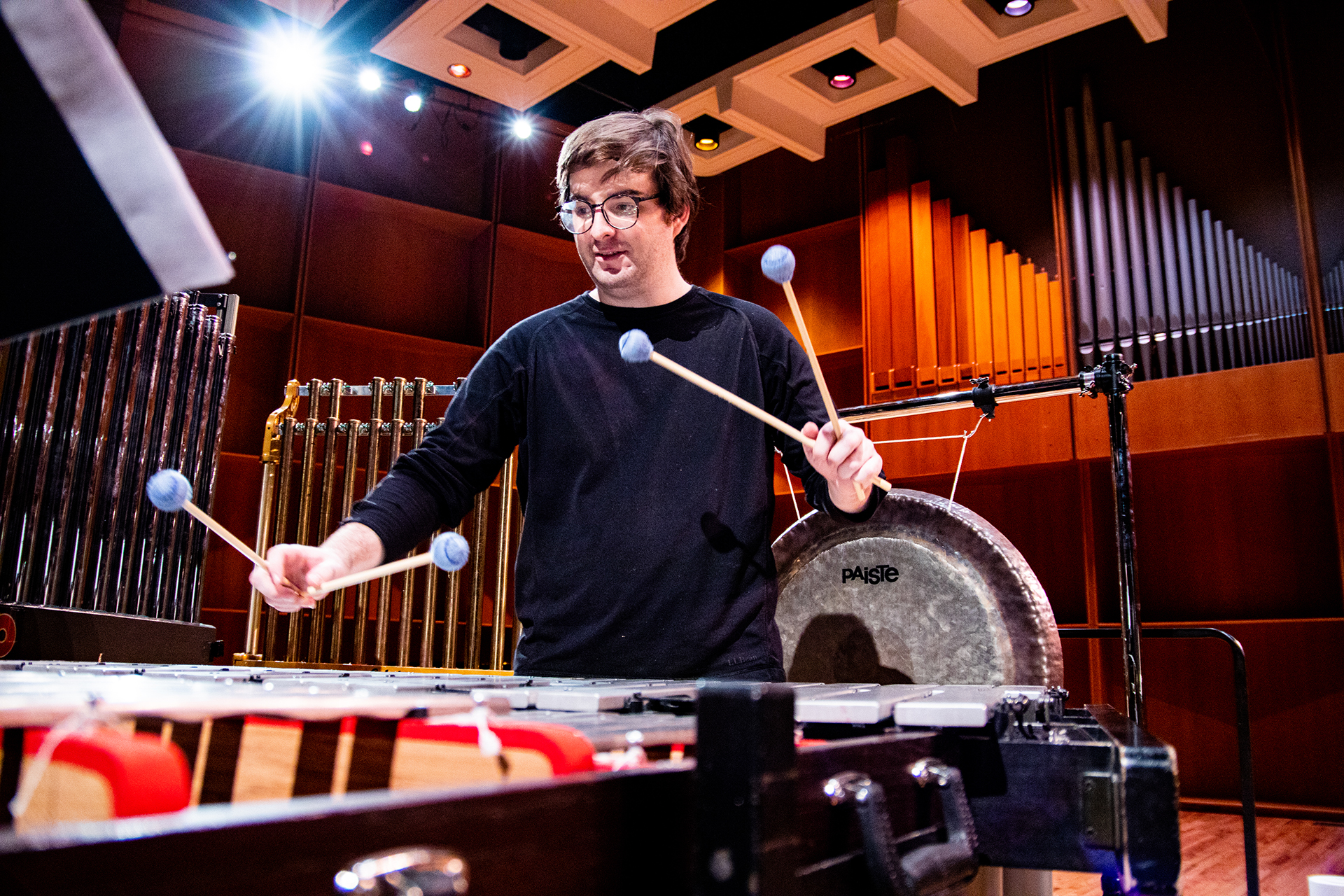 Dr. Sean Dowgray is a classical percussionist specializing in modern and contemporary
music. Dowgray is a proponent of creative collaborations which has resulted in recent
musical works by Daniel Tacke (Vorrücken and einsamkeit), Josh Levine (Shrinking world/expanding
and Les yeux ouverts) as well as new chamber works by Justin Murphy-Mancini (Sic itur
ad astra and A Song of Grecis.) and Lydia Winsor Brinadmour (As if, sand). In the
recent past, Dowgray has collaborated closely with composers including Jürg Frey (Garden
of Transparency), Christopher Adler (Strata), Ioannis Mitsialis (Machine Mode), Lewis
Nielson (Where Ashes Make the Flowers Grow and NOVA), and James Wood (Cloud Polyphonies).
As a soloist, Dr. Dowgray has focused extensively on works that stretch the technical
and expressive capabilities of both instrument and performer. This includes the work
of Jason Eckardt, Josh Levine, Daniel Tacke, Salvatore Sciarrino, Lewis Nielson, David
Lang, Christopher Adler, Brian Ferneyhough, Luciano Berio, Richard Barrett. Dowgray
has been featured as a soloist at the Oberlin Percussion Institute, the Percussive
Art Society International Convention (PASIC), the WasteLAnd New Music Series, Harvard’s
Institute for Advanced Learning, the University of Arizona, the SoundON New Music
Festival, and Eureka! Musical Minds of California. As a creative practitioner, Dowgray
has focused recently on his project, WHEN for mixed ensemble set to premiere in 2025.
He recently completed the interdisciplinary collaboration, In A Time of Change: Boreal
Forest Stories featuring artists and scientists. As part of this collaboration, Dowgray
created the work Moving Through the Boreal Forest in partnership with Maïté Agopian
(light and shadow work) and Daryl Farmer (poetry), Associate Professor of English
at UAF. Dr. Dowgray is a graduate of the Interlochen Arts Academy where he studied
with John Alfieri, the Oberlin Conservatory (B.M.) where studied with Michael Rosen,
the University of Alaska Fairbanks (M.M.) where he studied with Dr. Morris Palter,
and the University of California San Diego (D.M.A) where he studied with Steven Schick.
In Dr. Dowgray's dissertation, Time Being: Percussion as a Study of Time, he presents
an analyses of new and rarely heard works for and with percussion through theoretical
frameworks of time study from authors including Jonathan Kramer, J.T. Fraser, Edward
T. Hall, and others. Recent notable performances include John Corigliano's percussion
concerto, Conjurer with the Fairbanks Symphony Orchestra and Lewis Nielson's Lengua
Encubierto for solo percussion at the Percussive Arts Society International Convention
(PASIC).
Dr. Sean Dowgray is a classical percussionist specializing in modern and contemporary
music. Dowgray is a proponent of creative collaborations which has resulted in recent
musical works by Daniel Tacke (Vorrücken and einsamkeit), Josh Levine (Shrinking world/expanding
and Les yeux ouverts) as well as new chamber works by Justin Murphy-Mancini (Sic itur
ad astra and A Song of Grecis.) and Lydia Winsor Brinadmour (As if, sand). In the
recent past, Dowgray has collaborated closely with composers including Jürg Frey (Garden
of Transparency), Christopher Adler (Strata), Ioannis Mitsialis (Machine Mode), Lewis
Nielson (Where Ashes Make the Flowers Grow and NOVA), and James Wood (Cloud Polyphonies).
As a soloist, Dr. Dowgray has focused extensively on works that stretch the technical
and expressive capabilities of both instrument and performer. This includes the work
of Jason Eckardt, Josh Levine, Daniel Tacke, Salvatore Sciarrino, Lewis Nielson, David
Lang, Christopher Adler, Brian Ferneyhough, Luciano Berio, Richard Barrett. Dowgray
has been featured as a soloist at the Oberlin Percussion Institute, the Percussive
Art Society International Convention (PASIC), the WasteLAnd New Music Series, Harvard’s
Institute for Advanced Learning, the University of Arizona, the SoundON New Music
Festival, and Eureka! Musical Minds of California. As a creative practitioner, Dowgray
has focused recently on his project, WHEN for mixed ensemble set to premiere in 2025.
He recently completed the interdisciplinary collaboration, In A Time of Change: Boreal
Forest Stories featuring artists and scientists. As part of this collaboration, Dowgray
created the work Moving Through the Boreal Forest in partnership with Maïté Agopian
(light and shadow work) and Daryl Farmer (poetry), Associate Professor of English
at UAF. Dr. Dowgray is a graduate of the Interlochen Arts Academy where he studied
with John Alfieri, the Oberlin Conservatory (B.M.) where studied with Michael Rosen,
the University of Alaska Fairbanks (M.M.) where he studied with Dr. Morris Palter,
and the University of California San Diego (D.M.A) where he studied with Steven Schick.
In Dr. Dowgray's dissertation, Time Being: Percussion as a Study of Time, he presents
an analyses of new and rarely heard works for and with percussion through theoretical
frameworks of time study from authors including Jonathan Kramer, J.T. Fraser, Edward
T. Hall, and others. Recent notable performances include John Corigliano's percussion
concerto, Conjurer with the Fairbanks Symphony Orchestra and Lewis Nielson's Lengua
Encubierto for solo percussion at the Percussive Arts Society International Convention
(PASIC).

